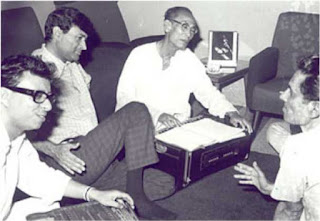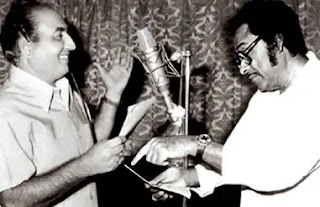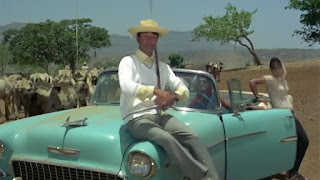The sensational and soulful ‘60s in the Bombay film
industry was that phase when traditional Indian music saw its experimental
fusion with the essence of Western Blues and Jazz backed by drums and trumpets,
and came to the fore Sachin Dev Burman with his unparalleled cravings for
amalgamation of Hindusthani music with the all-sweeping occidental zest for
rock-and-roll. It was also the era of Hindi film music when the array of
legendary singers, music composers and lyricists, hailing from varied cultures
and traditions, were producing evergreen masterpieces for the generations to
come. Quite obviously one had to outdo oneself as a music composer to stand
tall among all the other stalwarts, all equally adept in the art of music rendition.
And that’s exactly what S. D. Burman was doing with easeful elegance. Better to
say, as a music composer, he was just about in his flight bound for the
meridian of supremacy.
But that’s not what we are about to move our thoughts around. Of course, we are going to confabulate on the master craftsman S. D. Burman, the maestro in the precinct of music composition assisted by his son R. D. Burman, yet it’s going to be a discussion centering around one particular song that could have topped the chart and be etched forever on the lips of music lovers, and thus won’t have let another be scripted in the history of Hindi film music.
By the mid-60s, Guru Dutt, the showman eons ahead of his time, already had quite a few numbers of Box-office hits to his directorial as well as productional credits. On the other hand, apart from the successful joint ventures with Dev Anand’s Navketan Films lasting till his death in 1975, S. D. Burman teamed up with Guru Dutt for his cult-classics like Baazi (1951), Jaal (1952), C.I.D. (1956), Pyaasa (1957), Kaagaz Ke Phool (1959), Sahib Bibi Aur Ghulam (1962), leading up to Guru Dutt’s last reel production Baharain Phir Bhi Ayengi in 1966. It’s worth a reminder here at this juncture that S. D. Burman suffered a massive heart attack in 1964 due to which he had to give up the project and was replaced with O. P. Nayyar after having already recorded a song or two for the film.
Now shifting to a different chapter of film studies, let’s have a sneak into the 1957 English movie The Bridge on the River Kwai (https://en.wikipedia.org/wiki/The_Bridge_on_the_River_Kwai), an epic war film by genre, directed by David Lean. The music was composed by Malcolm Arnold. The film, which was an adaptation of a novel by Pierre Boulle, had a marching sequence shot in tune with band music. The music goes like this: https://youtu.be/83bmsluWHZc. Going by the words of Amit Kumar, the film was showing at Metro Theatre in Bombay, and he and his legendary singer father Kishore Kumar went along with S. D. Burman to watch the film. During intermission, S. D. Burman whispered over shoulders into Kishore Kumar’s ears that he had liked the phrase of the marching tune (https://youtu.be/uoAZfQrdLCY) and kept it in mind so that he could use it in future.
The opportune moment arrived in 1964
when Guru Dutt approached S. D. Burman for the music of Baharain Phir Bhi Ayengi which he was going to star in
two years' time. But sadly, Guru Dutt died in October that year. But much
before that S. D. Burman had been replaced with O. P. Nayyar. Even before that
S. D. Burman had remastered the tune he heard about six years back in an epic
English movie with a shrewd change to the original score of Malcolm Arnold and
made Mohammad Rafi sing the song. Had Guru Dutt been alive, and Burman not
taken ill, this would have made it to the list of songs of the movie to be
released two years later. But it was not meant to be! The entire project got
stalled for some time until it underwent some radical changes. Just as O. P.
Nayyar was introduced to the venture Dharmendra replaced Guru Dutt in the
leading role. Then, as destiny might have decided, S. D Burman kept the
unreleased song with him not knowing what he might do with it.
So,
after this much aberrance up till the making, the film was finally released in
1966. Now, if anybody, especially a Mohammad Rafi connoisseur, fancies
listening to that unpublished gem, would surely rue over the fact of misfortune
having struck such a soul-soothing composition of Koi Na Tera Saathi Ho: https://youtu.be/T7dvqOpgPOg. Even, one watching the sequence of Dharmendra travelling
by train will be able to trace the similarities between the track sung by Rafi
and the train shots: the rumbling rhythm conjuring up the sight of the train
wheels and flutes sounding like the train whistle are the two significant elements
of synonymity between the two. The existing version of the song Badal Jaye Agar
Maali (https://youtu.be/cbEJuFD4be4) was sung by a bit more crooning voice, Mahendra
Kapur. But the sequence remained the same.
Meanwhile,
Burman got busy with his works to further the extent of his partnership with
Navketan Films through the music for films like Guide (1965) and Jewel Thief (1967).
One mustn’t though forget that although his son Rahul Dev Burman himself had
already set foot in the arena of music composition through Chhote Nawab (1961)
he was still very much an assistant to his father, especially in the case of
title music and background scores, of which the one of Jewel Thief is somewhat
a standalone performance by the junior Burman (https://youtu.be/bEPxQlJZOHs).
Now,
we come down to that moment when Senior Burman got busy weaving music for the
lyrics of Majrooh Sultanpuri for Jewel Thief around 1965-66. This was the very
snap of time one forgotten composition had long been looking forward to: out
came the song once sung by Mohammad Rafi from the collection of unreleased
songs… Koi Na Tera Saathi Ho. But this time round, S. D. Burman had to go for
the heavy dash mixed with levity, which of course belonged to none other than
Kishore Kumar, as it suited Dev Anand the best (https://youtu.be/FKRdfz466wE).
And thus finally, the set-aside composition saw the dazzle of evergreen-ness through a majestic revival. One can easily visualize Dev Anand, propped with a fishing rod, standing in the way of Tanuja and company driving past a brownish-greenish valley, and the latter fuming exasperation at such an insolent behaviour of the former, but sadly all at the expense of another gem of a song by another legend.
So, we can say that had the song sung by Rafi not been shelved into oblivion, Yeh Dil Na Hota Bechara by Kishore would never have been a reality.






Comments
Post a Comment